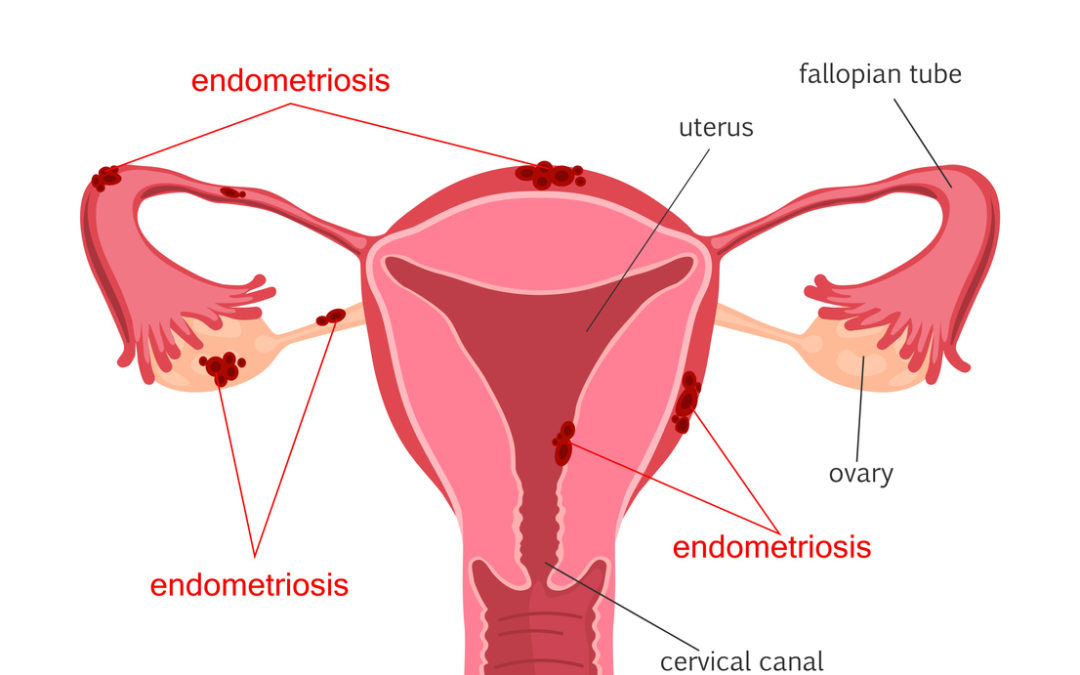
Endometriosis and Diet – Foods to avoid and what you should eat more of to help relieve symptoms
What is endometriosis?
Endometriosis is a disease that occurs when the uterine lining appears outside the uterine cavity. This can be within the uterine musculature, but also outside the uterus. As a result, it’s possible to find uterine tissue throughout the whole body, reaching from the ovaries, fallopian tubes, intestines, lungs, diaphragm and even as far as the brain.
This stray tissue reacts to hormonal cycles like the normal endometrium, meaning it bleeds during menstruation. Therefore, the type of symptoms that affect each individual largely depends on the location and the amount of tissue.
High levels of oestrogen and low progesterone levels are often detected in women with endometriosis. Normally the troubles lessen or even vanish after menopause as the body produces
What are the symptoms?
Women between 25 – 45 years are mostly affected but it can already develop in the teenage years. In approx. 50% of cases, there are no complaints and women are often diagnosed with endometriosis during a check-up after suffering infertility.
In circa 50% of the other cases, women with endometriosis often report symptoms like:
- back pain especially in the lower back
- lower abdominal pain or bloating
- mild to extremely painful periods
- infertility
- pain during intercourse
- cyclic or chronic pelvic pain
- inter-menstrual bleeding
- excessive bleeding
- blood in the urine or stool
- pain during bowel movement and urination
The symptoms experienced can be cyclical in their pattern. Endometriosis is divided into stages I-IV of severity and, in the worst case, can lead to intestinal obstruction, adhesions, bloody cysts, inflammations and ectopic pregnancies. It can widely affect a woman’s quality of life and relationships as well as her sexual life.
What causes endometriosis?
There are various theories for the causes of endometriosis and it is still not fully understood by Western medicine. Besides retrograde menstruation, a weakness of the immune system and trigger factors, such as hormonal and vegetative components are considered.
Several toxicological factors can promote the disease like plasticisers, pesticides, insecticides, heavy metals and other parameters.
A genetic predisposition can be seen as well and often several women in the same family lineage are affected.
Another important factor is diet. Endometriosis relates in particular to oxidative stress caused by smoking, malnutrition, and chemical dyes and additives in foods. Women with endometriosis absorb significantly fewer antioxidants like vitamin C + E, vitamin Bs, copper, zinc and selenium. Often low vitamin D levels are detected.
Diet and endometriosis
The diet for endometriosis calms the immune system: to reduce inflammation, ease pain, promote healthy gut flora, lower oestrogen levels and to achieve normal hormonal levels.
Foods you should avoid
Alcohol reduces levels of vitamin B which is needed for
Dairy foods like cheese, milk, yoghurt, butter, ice cream, condensed milk and any other product that contains milk powder. Dairy is known to be one of the most inflammatory food sources and should be cut off for a certain period of time.
Hydrogenated fats (also called trans-fatty acids) like stick margarine, bakery products, processed foods, crackers, fast foods and fried foods. These unhealthy fats can increase inflammation and have an impact on the liver’s health and are really hard to digest.
Oestrogen and phytoestrogen-rich foods like soy milk, soybeans, tofu, tempeh any other soy product. Garlic, multigrain bread, flax seeds and flax seeds bread, sesame seeds, walnuts, chestnut, almonds, pistachios, red wine, dried fruits, red meat, animal fats and especially hormonally treated meat. Many women with endometriosis have
Sign up for my free “7-Days to Boost your Metabolism” course and learn the basic principles of Ayurveda for a properly functioning metabolism. Find better sleep, boost your immune system and have a strong digestion to balance your hormones naturally.
Best foods to consume
Eat plenty of foods rich in omega 3 fats like hemp seeds, seaweed, chia seeds, salmon, mackerel, oyster, anchovies, sardine, shellfish, cod liver oil (also rich in vitamin D) and caviar. Omega 3 fats are said to have anti-inflammatory effects.
Consume foods rich in vitamin Bs like sunflower seeds, green vegetables, fresh green herbs, whole grains, nutritional yeast, trout, tuna, salmon, egg (prefer free-range and eat in moderation). A diet rich in vitamin B and omega 3 fats
Choose organic foods over conventional foods to lower your intake of pesticides and chemical herbicides which can affect hormonal balance. Organic foods often contain higher levels of minerals and vitamins.
Consume more foods that balance oestrogen levels like carrots, spinach, broccoli, cabbage, cauliflower, red cabbage, Brussels sprouts, green cabbage, wholemeal cereals. Eaten regularly they support a healthy oestrogen level in the body.
Add more foods that support healthy liver function like leafy green vegetables (kale, spinach, mustard greens, etc), artichoke, dandelion, milk thistle, chicory, peppermint, olive, and green fresh herbs. Keep in mind that the liver’s health is crucial for having balanced oestrogen levels.
Consume enough magnesium which you find in whole grains, almonds, legumes, pumpkin and chia seeds, quinoa, mackerel, salmon and leafy green vegetables. Magnesium is a muscle relaxant and can help to ease
Have a diet which is rich in antioxidants
Fermented foods like kefir, sauerkraut, pickles, kimchi, miso and kombucha. They support
Turmeric also called
How would it feel to free yourself from your symptoms? Ready to change and invest time and energy to get to the root of your problem? Then book your session now. I am looking forward to meeting you.
Some literature links and references
Diet and endometriosis risk
https://www.rbmojournal.com/article/S1472-6483(13)00007-2/fulltext
Evaluation of the Relationship between Endometriosis and Omega-3 and Omega-6 Polyunsaturated Fatty Acids
https://www.ncbi.nlm.nih.gov/pmc/articles/PMC3614254/
Endometriosis and Fertility
https://www.ncbi.nlm.nih.gov/pmc/articles/PMC5351695/
Anti-inflammatory properties of curcumin, a major constituent of Curcuma longa
https://www.ncbi.nlm.nih.gov/pubmed/19594223
Lewis, Randine. The Infertility Cure. New York: Little, Brown and Company, 2004

